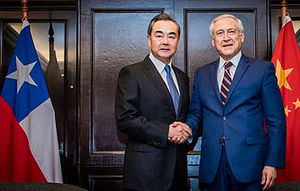As relations between the United States and Latin America appears to be deteriorating under the Trump administration, China is actively embracing Latin American and Caribbean countries. In particular, Beijing is trying to engage them in the Belt and Road Initiative (BRI), Chinese President Xi Jinping’s flagship diplomatic project.
On January 22, the Second Ministerial Meeting of the Forum of China and the Community of Latin American and Caribbean States (CELAC) was held in Santiago, Chile. Aiming to deepen Latin American integration and, according to some, reduce the influence of the United States, CELAC is a regional bloc formed in Venezuela in 2011 that does not include the United States or Canada.
China’s Foreign Minister Wang Yi, together with his counterparts from 31 Latin American and Caribbean countries as well as heads of four regional organizations and multilateral institutions, including the United Nations Economic Commission for Latin America and the Caribbean, attended the recent meeting.
According to China’s state news agency Xinhua, the meeting made a special announcement on the China-proposed BRI, claiming that the initiative will “inject new energy into the China-CELAC comprehensive cooperative partnership and open up new prospects.”
Reuters reported that Wang Yi said the region was “a natural fit for the initiative.”
“China will always stay committed to the path of peaceful development and the win-win strategy of opening up and stands ready to share development dividends with all countries,” Wang added.
Referring to the meeting as “a full success,” Chinese foreign ministry spokesperson Hua Chunying claimed that many Latin American countries “are eager to be part of ” the BRI. Hua also revealed that under the BRI, China has proposed to “build ‘grand connectivity’ covering both sea and land, cultivate ‘grand markets’ that are open and reciprocal, [and] create ‘grand industries’ featuring advanced and independent technologies” in this region.
Chile, the host country for this forum, particularly highlighted its friendship with China.
During his meeting with Wang Yi, Chile’s Foreign Minister Heraldo Muñoz said, “Chile has always been the first in the vanguard: the first to recognize the People’s Republic of China in South America in 1970; the first to negotiate China’s membership of Latin America in the WTO; the first to recognize China as a market economy; the first to have signed a trade agreement and the first to have expanded it.”
Muñoz also emphasized that “we are in uncertain and complex times and China is playing a very constructive role in addressing these complexities.”
Muñoz earlier criticized U.S. President Donald Trump’s foreign policy. After Trump reportedly referred to some Latin American states as “shithole countries,” Muñoz offered to welcome immigrants from those countries.
He also urged China to reject protectionism together with Chile and the rest of the countries of Latin America and the Caribbean, which could again be read as a dig at Trump’s “America First” platform.

































